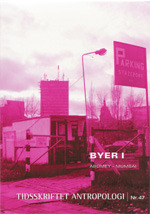KØBENHAVN
DOI:
https://doi.org/10.7146/ta.v0i47.107115Abstract
In this article I present findings of a phenomenological
study of the relationship
between urban space, sexuality and gender.
I have investigated conditions of
urban spaces in which social gatherings
established among equal and perceptived
adults expressing their sexual lusts and
pleasures are allowed and encouraged. I
have characterised these urban spaces as
queer spaces. In the first part, I present
circumstances that have imperative significance
to the existence of queer spaces,
and I argue that queer spaces exist in the
metropolis and because of the metropolis.
Hereafter, I expound the yearnings that
are related to queer spaces and point out
that for some individuals queer space
equals an emancipated and at the same
time an oppositional space to other urban
spaces. For other individuals queer space
is taken as a parallel space to other urban
spaces. These different connotations to
queer spaces are related to a dichotomy of
either keeping a queer sexuality a secret
or being open about it. Finally, I suggest
that queer space serves as home territory
recognised by being something in between
the wide, open urban space, and the
intimate, private space, and this unique
trait of queer space contributes to a redefinition
of the positions of men and women
in their sexual performances in public.
Downloads
Published
How to Cite
Issue
Section
License
Ophavsretten til artiklerne i Tidsskriftet Antropologi tilfalder forfatteren.
Artikler publiceret i Tidsskriftet Antropologi må citeres, downloades og videresendes for ikke-kommerciel brug, under forudsætning af normal akademisk reference til forfatter(e) samt tidsskrift, årgang, nummer og sider. Artiklerne må kun genudgives med eksplicit tilladelse fra forfatter(e) og tidsskriftet.


